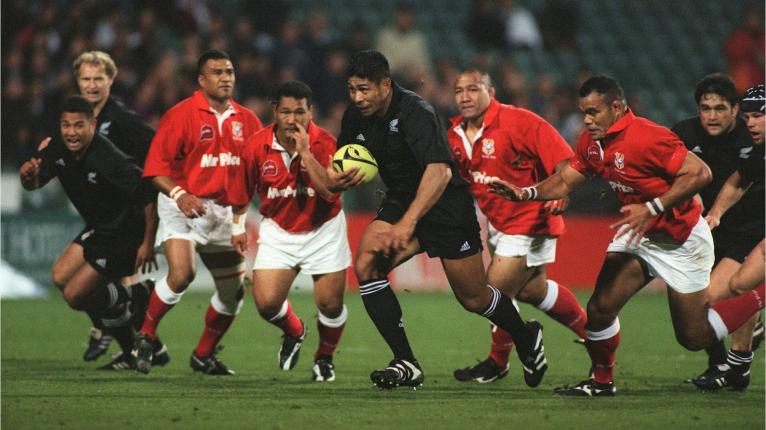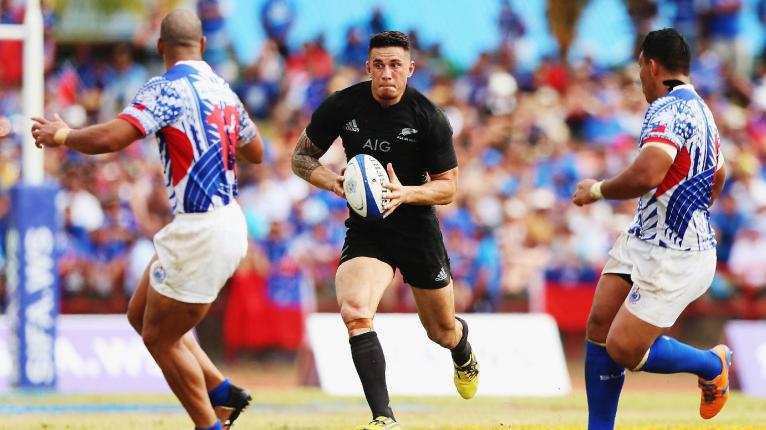It doesn't matter how much money World Rugby throws at the Pacific nations without meaningful competition

Toutai Kefu didn’t mince his words when he spoke of the aspirations he holds for his Tonga side as they prepare to compete in their eighth World Cup.
“I’m fixated on making the play-offs,” the 45-year-old former World Cup-winning Wallaby said after announcing his 31-man ‘Ikale Tahi squad for this month’s tournament in Japan.
“We need to win three games for that. We’re in a tough pool, there’s no doubt about it.
“We just need to get together and believe in what we’re doing, and believe that we can make it. And I certainly think we can.”
It was an admirably bold statement from someone who is coaching a side which has never qualified from the pool stage in every World Cup they’ve been part of since 1987.
Inside Tonga’s World Cup preparations – Documentary Trailer:
Achieving that lofty goal is certainly going to be made tougher by Tonga being grouped alongside England, France, Argentina and the United States in what has been dubbed the ‘Pool of Death’.
The expectation Kefu has set for his team is heartening and illustrates the standard of which Tonga have set for themselves on rugby’s biggest stage.
But, to be frank, the prospect of the world’s 15th-ranked side appearing in their maiden quarter-final next month is simply not a foreseeable outcome – and that’s through no fault of their own.
How could it be when they’ve just played 21 tests since the 2015 World Cup, only four of which have come against tier one nations.
Compare that to the track record of the All Blacks – who have played 47 tests since their World Cup success four years ago, with only three of those being against tier two sides – and it’s clear to see why Tonga were run off the park 92-7 when they faced the Kiwis in their final World Cup warm-up match in Hamilton last weekend.

To give credit where it’s due, the New Zealanders were in phenomenal form, playing a free-flowing brand of rugby that stretched the Tongan defence through a clinical ruthlessness on attack which may have left fellow World Cup contenders shuddering.
Until the substitution of Ryan Crotty in the 65th minute which left the All Blacks with 14 men for the remainder of the game, there wasn’t much defensive work to be asked of the hosts.
When they were tasked with defending their own line, though, they did so with discipline and intent, so it must have been a relief for the ‘Ikale Tahi when Crotty departed the field with no replacement in sight.
What is yet to be relieved, however, is the continual shafting of tier two nations – particularly those in the Pacific – by World Rugby which has led to scorelines such as the one seen at Waikato Stadium on the weekend.
The progress of countries that appear regularly at events like the World Cup but constantly fail to make an on-field impact against tier one sides due to their lack of development between World Cup cycles – a la Fiji, Samoa, Tonga, Georgia, Japan, the USA, Canada etc – is a debate that has ravaged the rugby world since the game turned professional 24 years ago.
It’s a conversation that All Blacks head coach Steve Hansen gave attention to following his side’s demolition of their Pacific neighbours.
He laid blame on World Rugby’s inability to bring to fruition the proposed Nations Championship because of resistance from the tradition-based Six Nations unions.
The Nations Championship was, of course, an idea coined by World Rugby for a global international league which would have seen a drastic increase in regular fixtures between tier one nations and smaller unions through a promotion-relegation mechanism implemented throughout multiple divisions.

In theory, it would have provided a pathway for national teams of even the smallest stature to work their way up the ranks to the point where they could have faced the likes of the All Blacks, Springboks and England on an annual basis.
It would have also significantly bolstered the coffers of several financially-embattled unions, with World Rugby at the time promising countries extra revenue of $10-14m per year.
That idea eventually came to a standstill, though, as Six Nations unions such as Scotland and Ireland were believed to be uncomfortable with the prospect of being demoted to a second division.
“The problem is that we’ve got a calendar that doesn’t allow you to do that,” Hansen said of Tonga’s, and other tier two nations’, threadbare test schedules.
“We have these wonderful ideas about growing the game but we don’t have an organisation at the top that wants to be strong enough to say ‘righto, this is what we’re doing, we’re going to have a global season’.
“The Six Nations rule test rugby programs. They don’t want to give that up and until they’re prepared to give that up, we’re not going to see any progress in that area.”
Incoming New Zealand Rugby chief executive Mark Robinson echoed Hansen’s sentiments at his first press conference following the announcement of his new appointment on Monday.
“I think we saw on Saturday that it is concerning for the international game to have fixtures like that when we know that Tonga had so much more to offer,” he said.
https://www.instagram.com/p/B2LSEzig8_s/
“How critical if World Rugby wants to be a truly global game, then we need all those tier two teams to be as competitive as possible and to be able to grow other tier two unions so that, in time, more teams can be competing at the World Cup.
“The major things that seem to be affecting the unions in the Pacific at the moment relate to accessing the best of their talent and playing the best competitions possible. We can do better on both counts there. They will be conversations we will look to continue.”
Robinson mentioned how much more Tonga had to offer in their All Blacks clash four days ago, but they – and Fiji and Samoa – have already offered excess amounts to rugby.
A multitude of the game’s top stars, both past and present, have come from the Islands, and many of these players have made a name for themselves while representing countries that they weren’t born or raised in.
Manu Tuilagi (England), Virimi Vakatawa (France), Sevu Reece (New Zealand), Amanaki Mafi (Japan) and Taniela Tupou (Australia) are, for example, just a selection of Fijian, Samoan or Tongan-born players who are set to ignite this World Cup for nations of which they had immigrated to.
While World Rugby’s eligibility laws are questionable at best, it is, of course, the players’ decision as to who he wants to represent if eligible for more than one country.
It’s often a decision based on financial prosperity, something of which Fiji, Samoa, Tonga and other tier two nations severely lack and cannot provide for their players.
Bringing the Nations Championship to life would certainly have aided the financial issues prevalent within the Pacific, and World Rugby made a point of highlighting what they have done to help assist tier two nations on the monetary front in their response to Hansen.
World Rugby has refuted claims by All Blacks head coach Steve Hansen that it isn't doing enough for Pacific Island nations.https://t.co/Fm9V54SOJY
— RugbyPass (@RugbyPass) September 9, 2019
In a statement handed to the Daily Telegraph, it said that it had given “a record £60m support package for teams outside of the Six Nations and SANZAAR to compete at Rugby World Cup 2019.”
“120 of the 150 coaches and support staff involved in these teams have been identified and funded by World Rugby, while the Americas and Pacific combines and Fijian Drua are ensuring an environment that enables these unions to retain and develop their best young local talent and many of these players will feature at Japan 2019.”
Admittedly, World Rugby contributes £250,000 a year to support the Drua in the Australian National Rugby Championship, of which they won last year.
Additionally, it funds the salaries of head coaches of tier two nations, including that of Fiji, Canada and Namibia.
This is all well and good – if they are promoting and enhancing rugby within these smaller countries through financial aid, then that can only be a good thing.
But their statement misses the point that Hansen rightly made.
It doesn’t matter how much money World Rugby throws at development sides in provincial competitions or at the coaches of struggling international sides, because if these teams aren’t getting substantial exposure to tier one nations outside of the World Cup, their development as rugby-playing countries will continue to be hindered.
As Hansen alluded to, the Nations Championship concept brought with it a solution to this very problem, as well as the financial issues that minnow unions are currently enduring.
However, the weak leadership of World Rugby and narrow-mindedness of the cash-rich European unions has once again left the minnows empty-handed while players from their own back yards continue to shine for foreign teams.
Not that that will dent the hopes and dreams of Kefu and his Tongan squad as they continue to vie for that elusive spot in the world’s final eight in the Far East.
But, for as long as they, Fiji, Samoa and the rest of the tier two contingent are shut out from regularly competing against the best of the best, those dreams aren’t likely to become reality any time soon.
The Season with Hamilton Boys High School – Trailer:






























































